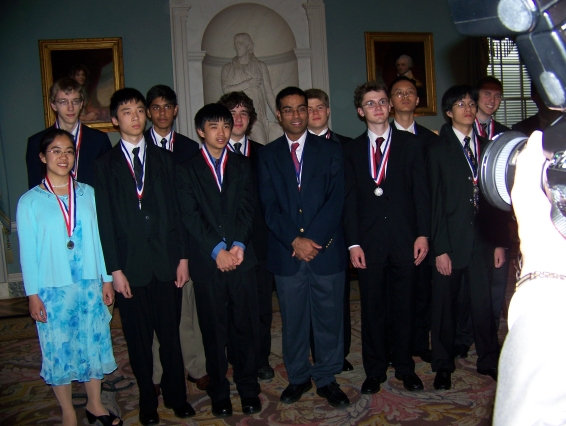USAMO and the Election, by J.B.
Today I have my first invited guest blogger, J.B. He is a 2006, 2007, 2008 and 2009 USAMO qualifier. He was also selected to be on the US team at the Romanian Masters in Mathematics competition. Also, he placed 6th at the North American Computational Linguistics Olympiad. Here is his piece:
The analysis is based on the list of 2009 USAMO qualifiers.
There is a rule that if nobody naturally qualifies for the USAMO from a state, then the highest scoring individual will qualify. Unfortunately, this means that we must remove those states with only one USAMO qualifier. We have 33 states remaining. If we sort these strictly by number of USAMO qualifiers, then we find the following result.
States with at least 4 USAMO qualifiers (24 total) voted for Obama, with the following exceptions: Georgia, Texas, South Carolina, and Missouri. In addition, of the two states with 3 USAMO qualifiers, one voted for Obama and one for McCain. The remaining states with 2 qualifiers (5 total) voted Republican.
Now this is not really unexpected. States with very large populations tend to be democratic and also produce more USAMO qualifiers. The most notable exceptions are Georgia and Texas, both of which were indeed exceptions (major outliers, in fact) above. This prompts the following consideration.
States with at least 8 USAMO qualifiers per 10 million residents (25 total) voted for Obama, with the following exceptions: Florida, Wisconsin, South Carolina, Missouri, and Georgia. Of these, all but Georgia fall within 50% of the target 8 USAMO qualifiers per 10 million residents. Georgia has 18 qualifiers per 10 million residents. Note also that the entire USA has 16 qualifiers per 10 million residents.
Furthermore, if USAMO qualifiers had been used instead of population for determining electoral votes, Obama would have won with 86% of the vote rather than 68%. In general, if the Democrat can secure all those states with at least 1 qualifier per million residents (plus DC), he will win with 303 votes. He can even lose the three red states in that category (Georgia, Missouri, and South Carolina) for exactly 269.
USAMO qualifiers per 10 million residents (for states with more than one qualifier) are:
- NH — 122 (all of their qualifiers are from Phillips Exeter Academy)
- MA — 55
- ME — 30
- CA — 29
- NJ — 29
- CT — 29
- VA — 28
- MD — 25
- WA — 21
- IN — 19
- OR — 19
- NY — 18
- GA — 18
- IA — 17
- NM — 15
- MI — 15
- PA — 14
- MO — 14
- SC — 13
- IL — 13
- NC — 13
- OH — 9
- CO — 8
- MN — 8
- UT — 7
- KS — 7
- WI — 7
- KY — 7
- TX — 7
- FL — 6
- LA — 5
- AL — 4
- TN — 3
The states with only one USAMO qualifier are WY, VT, ND, AK, SD, DE, MT, RI, HI, ID, NE, WV, NV, AR, MS, OK, and AZ. The only blue one of these which falls below 8 qualifiers per 10 million is Nevada (we would expect it to have at least 2 qualifiers to fit the expected pattern). Otherwise, it is at least possible that each state fits the pattern of 8 qualifiers per 10 million residents if and only if it votes Democratic.
Share: A new study is out. Dr. Satoshi Kanazawa blogged about his new discovery. He claims that he can explain why many studies show that men have higher intelligence than women. In his posting
A new study is out. Dr. Satoshi Kanazawa blogged about his new discovery. He claims that he can explain why many studies show that men have higher intelligence than women. In his posting